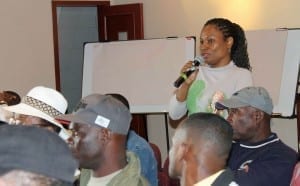
Some 127 labor activists took part in the second Afro-Colombian Labor Council conference in Bogotá. Credit: Rhett Doumitt
Ready to power forward with new grassroots organizing and mobilization outreach, 127 Afro-Colombian labor and community leaders met in Bogotá in recent days for the second national forum of the Afro-Colombian Labor Council (CLAF).
During the two-day gathering, Afro-Colombian labor rights activists shared the organization’s successes—among them, the amazing growth of the Domestic Service Workers’ Union (UTRASD) from a locally based group in the city of Medellín to a nationwide organization with 250 women.
A quarter of Colombia’s population is Afro-descendant, yet Afro-Colombians comprise more than 50 percent of the country’s poor. Formed in July 2012, CLAF is the first national organization to explicitly tackle the exploitive working conditions that most Afro-descendants suffer. Since its launch, CLAF has expanded from a national coordination board to an organization with 10 local chapters across Colombia, including Bogotá, Cartagena, Santa Marta, Urabá, Valle del Cauca, Medellín and Buenaventura.
“When you build things collectively, then everyone takes ownership of them,” said Agripina Hurtado, president of the CLAF executive board. “We need to promote the vision of where we are going—grow, connect and advocate around the challenges facing all Afro-Colombians.”
The non-governmental organization Escuela Nacional Sindical (ENS) presented research on working conditions in predominantly Afro-Colombian economic sectors, such as construction, domestic work, and ports, where ENS researchers found extreme levels of labor informality. Afro-Colombians are far likelier than other Colombian workers to earn less than the minimum wage and to be employed in jobs where they cannot form unions to improve their working conditions.
Leaders and activists at the meeting, held with the support of the Solidarity Center and the International Labor Organization (ILO), developed a three-pronged work strategy focusing on organization building, public policy advocacy and formalization of work.
